Ward A.W. The Cambridge History of British Foreign Policy. 1783-1919. Volume 3
Подождите немного. Документ загружается.

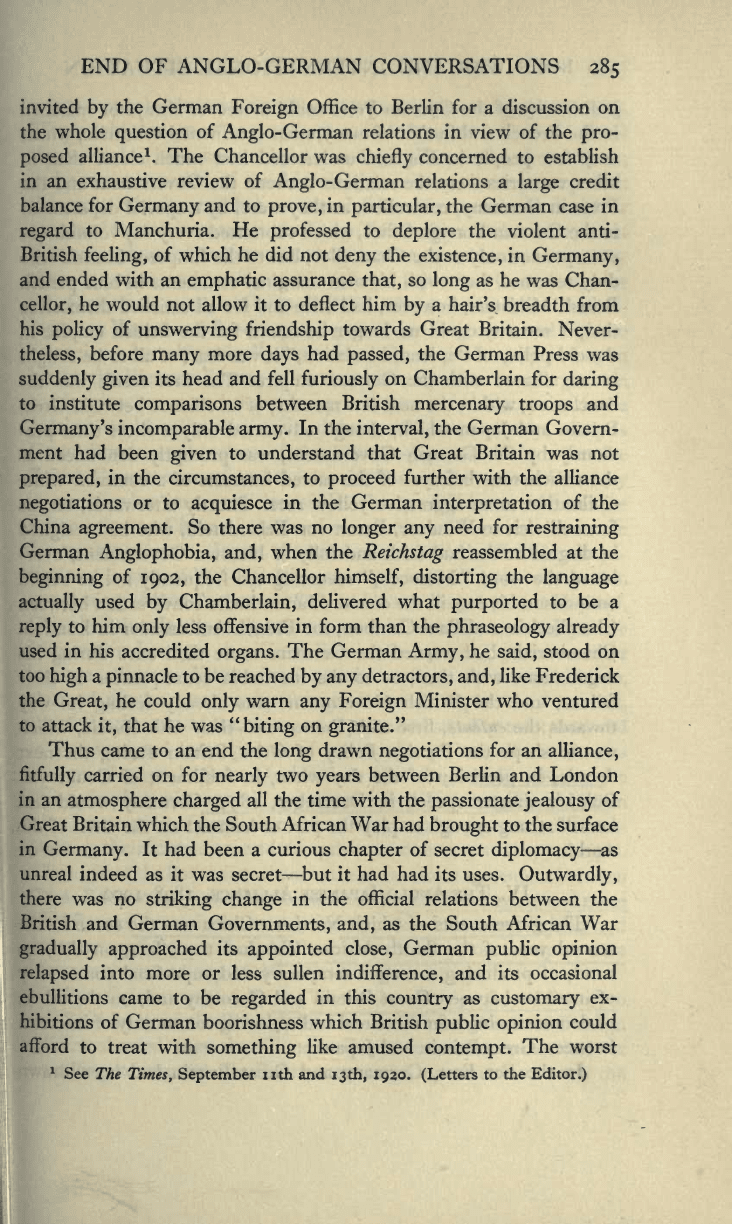
END OF ANGLO-GERMAN
CONVERSATIONS
285
invited
by
the German
Foreign
Office to Berlin
for a
discussion
on
the
whole
question
of
Anglo-German
relations
in view of the
pro-
posed
alliance
1
.
The Chancellor
was
chiefly
concerned
to establish
in
an
exhaustive review
of
Anglo-German
relations a
large
credit
balance
for
Germany
and
to
prove,
in
particular,
the
German case
in
regard
to Manchuria. He
professed
to
deplore
the
violent anti-
British
feeling,
of
which he
did
not
deny
the
existence,
in
Germany,
and ended
with an
emphatic
assurance
that,
so
long
as
he was Chan-
cellor,
he would
not allow it
to deflect
him
by
a
hair's
breadth from
his
policy
of
unswerving
friendship
towards Great
Britain.
Never-
theless,
before
many
more
days
had
passed,
the
German
Press
was
suddenly
given
its head and
fell
furiously
on Chamberlain
for
daring
to
institute
comparisons
between British
mercenary troops
and
Germany's
incomparable
army.
In
the
interval,
the German
Govern-
ment had
been
given
to understand that Great Britain was
not
prepared,
in
the
circumstances,
to
proceed
further with the
alliance
negotiations
or
to
acquiesce
in
the German
interpretation
of
the
China
agreement.
So
there
was
no
longer any
need
for
restraining
German
Anglophobia,
and,
when the
Reichstag
reassembled
at the
beginning
of
1902,
the Chancellor
himself,
distorting
the
language
actually
used
by
Chamberlain,
delivered what
purported
to be a
reply
to
him
only
less offensive
in form
than
the
phraseology
already
used in
his
accredited
organs.
The
German
Army,
he
said,
stood
on
too
high
a
pinnacle
to
be reached
by any
detractors,
and,
like Frederick
the
Great,
he could
only
warn
any
Foreign
Minister
who
ventured
to
attack
it,
that
he was
"biting
on
granite."
Thus
came
to
an
end
the
long
drawn
negotiations
for an
alliance,
fitfully
carried on for
nearly
two
years
between
Berlin and London
in
an
atmosphere
charged
all the time with the
passionate jealousy
of
Great Britain
which
the South
African War had
brought
to
the surface
in
Germany.
It
had
been
a curious
chapter
of
secret
diplomacy
—
as
unreal indeed as
it
was
secret
—
but it
had had
its
uses.
Outwardly,
there
was no
striking change
in
the
official
relations between the
British and
German
Governments,
and,
as
the South
African War
gradually approached
its
appointed
close,
German
public
opinion
relapsed
into
more
or
less sullen
indifference,
and its occasional
ebullitions
came to be
regarded
in
this
country
as
customary
ex-
hibitions of
German
boorishness
which
British
public opinion
could
afford
to
treat
with
something
like amused
contempt.
The worst
1
See
The
Times,
September
nth and
13th, 1920. (Letters
to
the
Editor.)
I
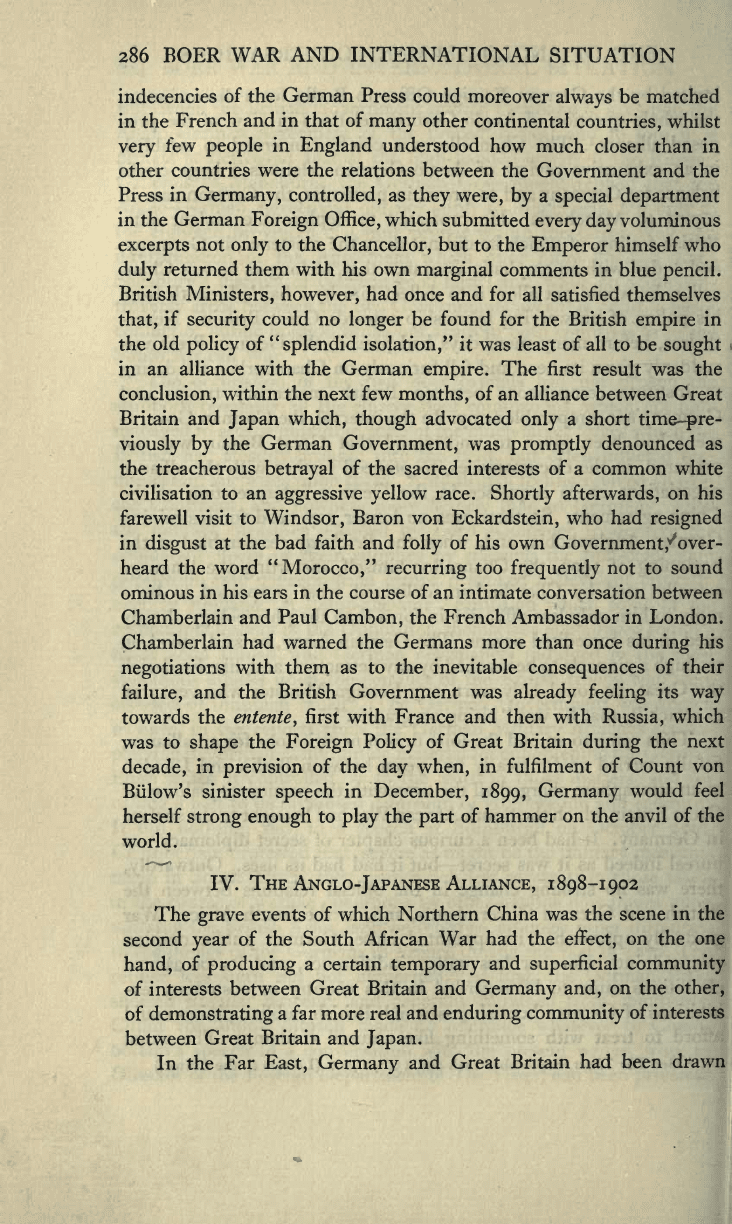
286
BOER
WAR
AND
INTERNATIONAL
SITUATION
indecencies
of the German Press could
moreover
always
be
matched
in
the
French
and in
that
of
many
other
continental
countries,
whilst
very
few
people
in
England
understood how
much
closer than
in
other
countries
were
the
relations
between the
Government
and
the
Press
in
Germany,
controlled,
as
they
were,
by
a
special department
in
the
German
Foreign
Office,
which
submitted
every day
voluminous
excerpts
not
only
to
the
Chancellor,
but to the
Emperor
himself
who
duly
returned them with his own
marginal
comments
in
blue
pencil.
British
Ministers, however,
had
once and
for
all satisfied themselves
that,
if
security
could no
longer
be found for
the British
empire
in
the
old
policy
of
''splendid
isolation,"
it
was
least
of all
to
be
sought
in an alliance with
the German
empire.
The
first result
was
the
conclusion,
within the next few
months,
of an
alliance
between
Great
Britain
and
Japan
which,
though
advocated
only
a short
time-pre-
viously by
the German
Government,
was
promptly
denounced
as
the
treacherous
betrayal
of
the
sacred
interests
of a common
white
civilisation to
an
aggressive yellow
race.
Shortly
afterwards,
on his
farewell visit
to
Windsor,
Baron
von
Eckardstein,
who had
resigned
in
disgust
at the
bad faith and
folly
of his own
Government/over-
heard the word
"Morocco,"
recurring
too
frequently
not
to
sound
ominous
in his ears
in
the
course of an
intimate conversation between
Chamberlain
and
Paul
Cambon,
the French Ambassador
in London.
Chamberlain
had warned
the
Germans more
than
once
during
his
negotiations
with them as to the inevitable
consequences
of
their
failure,
and the British Government
was
already feeling
its
way
towards
the
entente
,
first with
France and
then with
Russia,
which
was
to
shape
the
Foreign
Policy
of
Great Britain
during
the
next
decade,
in
prevision
of
the
day
when,
in
fulfilment
of
Count
von
Billow's sinister
speech
in
December,
1899,
Germany
would
feel
herself
strong enough
to
play
the
part
of
hammer
on
the
anvil
of
the
world.
IV.
The
Anglo-Japanese
Alliance,
1
898-1 902
The
grave
events of which Northern
China was
the
scene
in the
second
year
of
the South African
War
had
the
effect,
on
the
one
hand,
of
producing
a certain
temporary
and
superficial
community
of interests
between Great
Britain
and
Germany
and,
on the
other,
of
demonstrating
a far
more real
and
enduring
community
of interests
between
Great
Britain and
Japan.
In the
Far
East,
Germany
and
Great Britain
had been
drawn
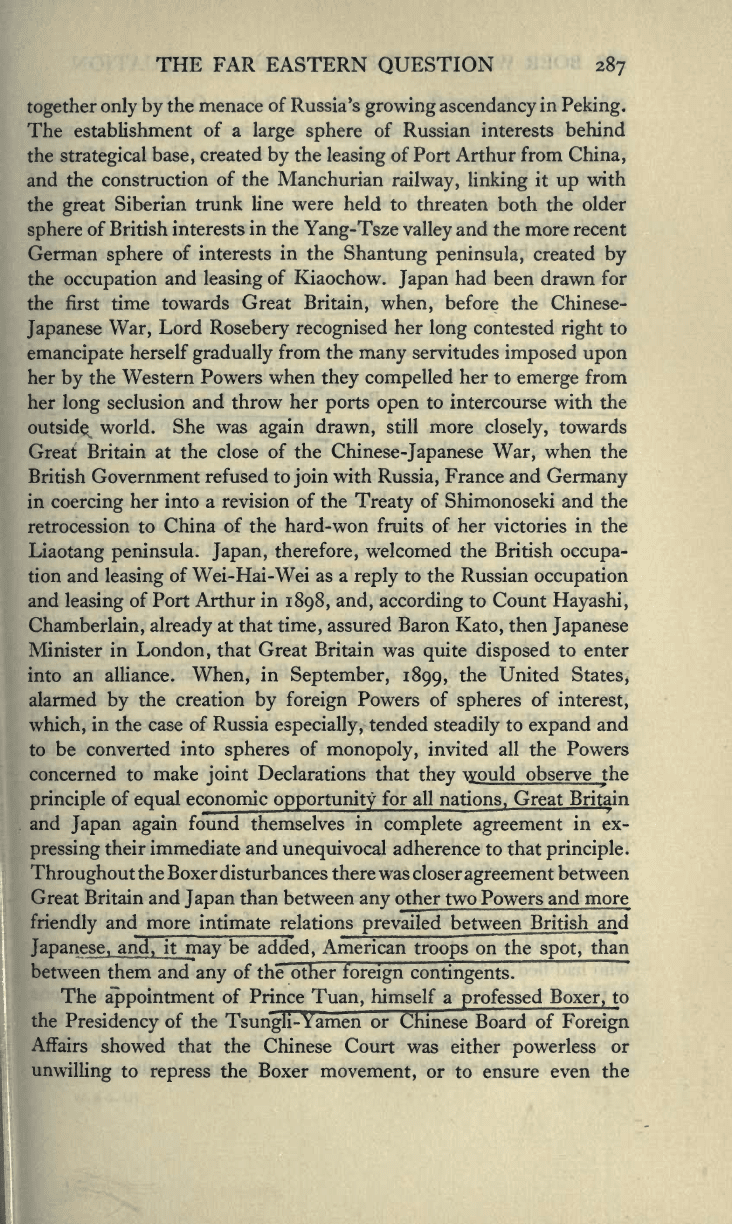
THE
FAR
EASTERN
QUESTION
287
together
only
by
the menace
of
Russia's
growing
ascendancy
in
Peking.
The establishment
of
a
large sphere
of Russian interests
behind
the
strategical
base,
created
by
the
leasing
of
Port Arthur
from
China,
and
the construction
of the
Manchurian
railway,
linking
it
up
with
the
great
Siberian trunk
line were
held to
threaten
both the
older
sphere
of British interests
in
the
Yang-Tsze
valley
and the
more recent
German
sphere
of
interests
in
the
Shantung
peninsula,
created
by
the
occupation
and
leasing
of
Kiaochow.
Japan
had
been drawn
for
the
first time towards
Great
Britain,
when,
before
the Chinese-
Japanese
War,
Lord
Rosebery recognised
her
long
contested
right
to
emancipate
herself
gradually
from the
many
servitudes
imposed
upon
her
by
the
Western
Powers
when
they
compelled
her to
emerge
from
her
long
seclusion
and
throw
her
ports open
to
intercourse with the
outside^
world. She
was
again
drawn,
still
more
closely,
towards
Great Britain at the
close
of
the
Chinese-Japanese
War,
when
the
British
Government
refused to
join
with
Russia,
France and
Germany
in
coercing
her into
a
revision
of
the
Treaty
of
Shimonoseki and
the
retrocession to
China of
the
hard-won
fruits
of her
victories
in
the
Liaotang peninsula.
Japan,
therefore,
welcomed the British
occupa-
tion
and
leasing
of
Wei-Hai-Wei as a
reply
to
the
Russian
occupation
and
leasing
of
Port Arthur
in
1898,
and,
according
to Count
Hayashi,
Chamberlain,
already
at that
time,
assured Baron
Kato,
then
Japanese
Minister
in
London,
that Great
Britain
was
quite
disposed
to enter
into an
alliance.
When,
in
September,
1899,
the United
States,
alarmed
by
the creation
by foreign
Powers
of
spheres
of
interest,
which,
in the case
of Russia
especially,
tended
steadily
to
expand
and
to
be
converted
into
spheres
of
monopoly,
invited
all
the
Powers
concerned to
make
joint
Declarations that
they
would
observe the
principle
of
equal
economic
opportunity
for
all nations
T
Great
Brita
in
and
Japan
again
found
themselves
in
complete
agreement
in
ex-
pressing
their immediate
and
unequivocal
adherence to that
principle,
'hroughout
the Boxerdisturbances there was
closer
agreement
between
rreat
Britain and
Japan
than between
any
other
two Powers
and
more
iendly
and
more
intimate relatio
ns
prevailed
between British
an
d
ipanese, and,
it
m
ay
be
added,
American
troops
on
the
spot,
than
Jtween them and
any
of
the other
foreign
contingents.
The
appointment
of
Prince Tu
an,
himself a
professed
Boxer,
t
o
le
Presidency
of
the
Tsungli-Yamen
or
Chinese Board
of
Foreign
Pairs
showed
that the Chinese
Court was
either
powerless
or
twilling
to
repress
the Boxer
movement,
or
to ensure
even the
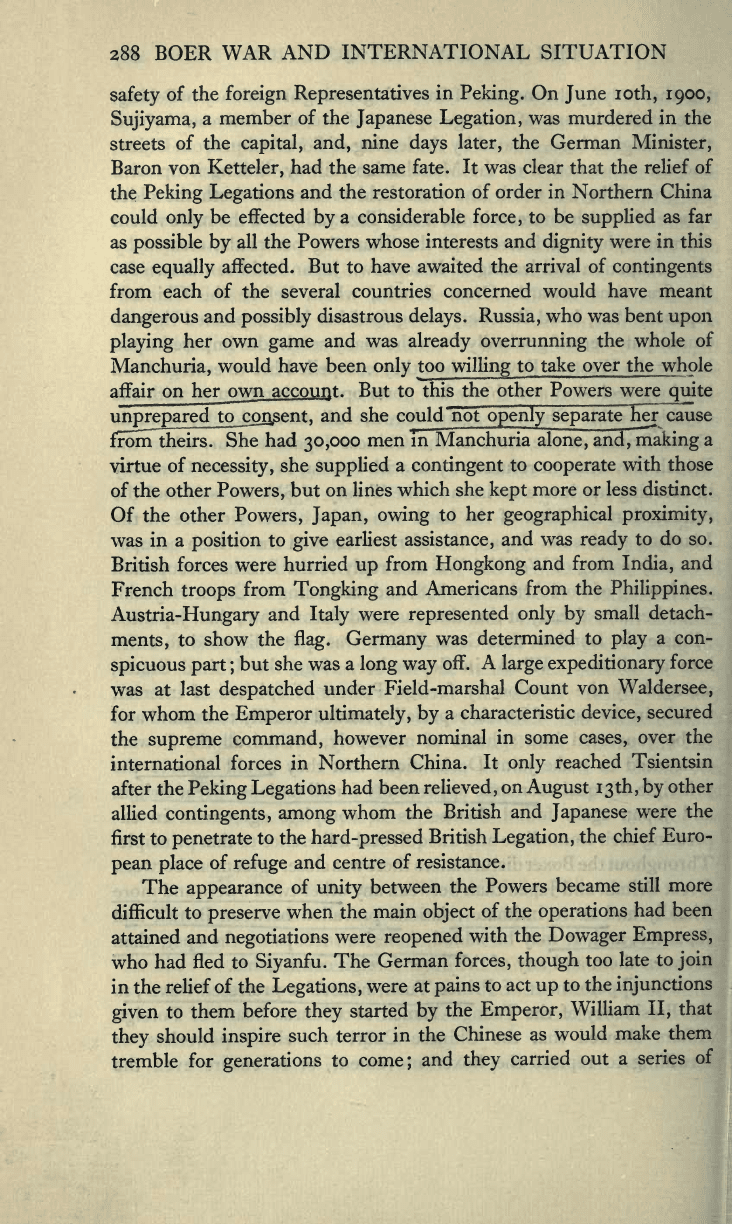
288 BOER
WAR
AND
INTERNATIONAL
SITUATION
safety
of
the
foreign
Representatives
in
Peking.
On
June
ioth,
1900,
Sujiyama,
a
member
of
the
Japanese Legation,
was
murdered
in
the
streets
of the
capital,
and,
nine
days
later,
the German
Minister,
Baron
von
Ketteler,
had the same fate. It
was
clear
that
the relief
of
the
Peking
Legations
and
the
restoration
of
order in
Northern
China
could
only
be effected
by
a considerable
force,
to be
supplied
as far
as
possible by
all
the
Powers whose interests
and
dignity
were
in
this
case
equally
affected. But
to
have
awaited
the
arrival of
contingents
from each
of
the
several
countries concerned
would
have
meant
dangerous
and
possibly
disastrous
delays.
Russia,
who
was
bent
upon
playing
her own
game
and was
already
overrunning
the whole
of
Manchuria,
would have been
only
too
willing
to
take
over
the w
hole
a
ffair on
her own account. But to this
the other
Powers
werejjuite
unprep
ared to
c
onsent,
and she
could
not
openly separate
he
r
cause
fronTtheirs.
She had
30,000
men
in Manchuria
alone,
and,
making
a
virtue
of
necessity,
she
supplied
a
contingent
to
cooperate
with those
of the other
Powers,
but
on lines
which she
kept
more
or less distinct.
Of
the other
Powers,
Japan,
owing
to her
geographical
proximity,
was
in a
position
to
give
earliest
assistance,
and was
ready
to
do
so.
British
forces were
hurried
up
from
Hongkong
and
from
India,
and
French
troops
from
Tongking
and
Americans
from
the
Philippines.
Austria-Hungary
and
Italy
were
represented
only by
small detach-
ments,
to
show the
flag.
Germany
was determined
to
play
a con-
spicuous
part
;
but she
was a
long
way
off.
A
large
expeditionary
force
was at
last
despatched
under Field-marshal
Count
von
Waldersee,
for whom the
Emperor
ultimately,
by
a
characteristic
device,
secured
the
supreme
command,
however
nominal
in some
cases,
over the
international
forces
in
Northern
China.
It
only
reached Tsientsin
after the
Peking Legations
had been
relieved,
on
August
13th, by
other
allied
contingents,
among
whom
the
British
and
Japanese
were
the
first
to
penetrate
to the
hard-pressed
British
Legation,
the
chief
Euro-
pean
place
of
refuge
and centre
of resistance.
The
appearance
of
unity
between
the
Powers
became
still
more
difficult
to
preserve
when the
main
object
of
the
operations
had been
attained
and
negotiations
were
reopened
with the
Dowager
Empress,
who
had fled
to
Siyanfu.
The German
forces,
though
too
late to
join
in
the
relief
of
the
Legations,
were
at
pains
to act
up
to
the
injunctions
given
to them
before
they
started
by
the
Emperor,
William
II,
that
they
should
inspire
such
terror
in the
Chinese
as would
make
them
tremble
for
generations
to
come;
and
they
carried
out
a series
of
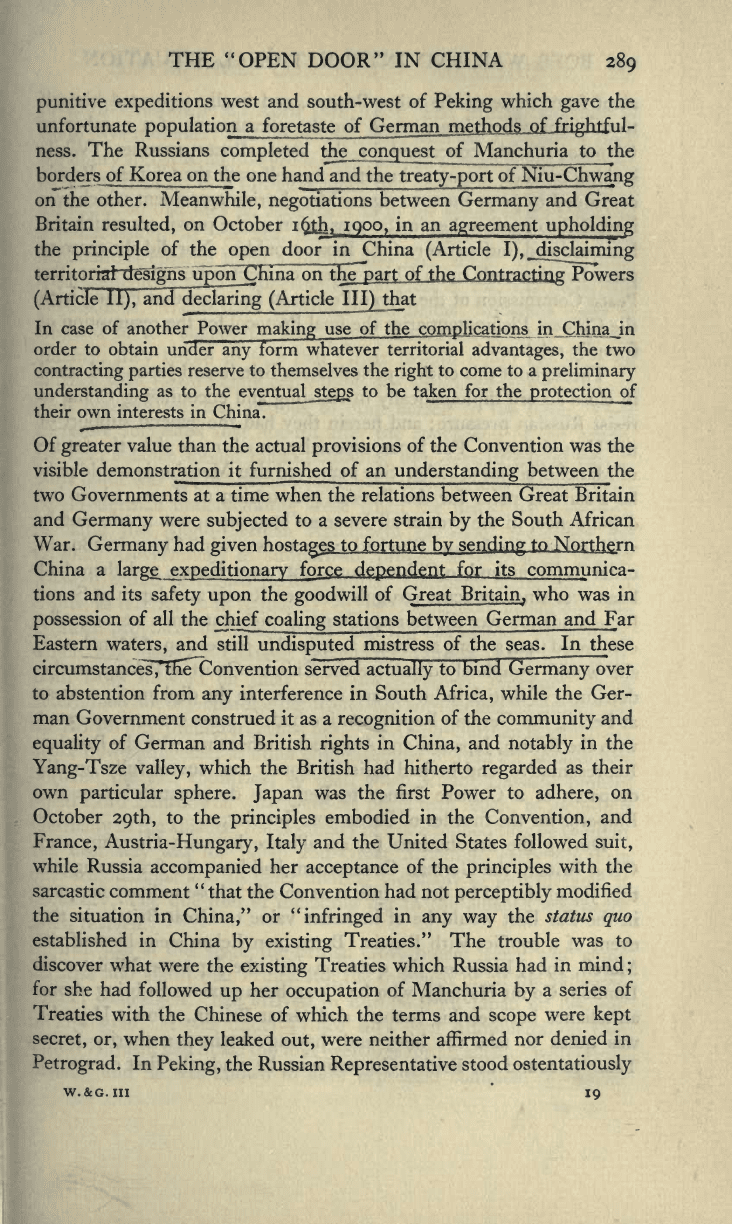
THE
"OPEN
DOOR"
IN CHINA
289
punitive
expeditions
west
and
south-west
of
Peking
which
gave
the
unfortunate
populatio
n
a
foretaste of German
m
ethods
of
frightfnl-
ness.
The Russians
completed
^conguest
of Manchuria
to
the
borders
of
Korea
on
the one hand
and
the
treaty-port
of Niu-Chwan
g
on the other.
Meanwhile,
negotiations
between
Germany
and
Great
Britain
resulted,
on
October
ifah, IQQQ,
in an
agreement
upholding
the
principle
of
the
open
door
in
China
(Article
I), ^disclaiming
territoriarndesig
ns
upon
China on
th
epart
of
the
Contracting
Powers
(Article II),
and
declaring (Article
Illjj
hat
In
case
of
anothe
r
Power
making
use of
the
compli
cations
in
China_jn
order to obtain
under
any
form whatever territorial
advantages,
the two
contracting parties
reserve
to
themselves the
right
to
come to
a
preliminary
understanding
as
to
the
eventual
j
teps
to be t
aken
for
the
protection
of
their own
interests
in
China.
Of
greater
value
than the
actual
provisions
of
the
Convention
was
the
visible
demonstration it furnished
of an
understanding
between
the
two Governments at
a
time when
the
relations between Great
Britain
and
Germany
were
subjected
to
a severe strain
by
the South African
War.
Germany
had
given
hosta
ges
to
fortune
by sending
to
Northern
China
a
large
e
xpeditionary
force
dependent
for its communica-
tions
and
its
safety upon
the
goodwill
of
Great
Britain,
who was in
possession
of
all
the chi
ef
coaling
stations
between
German
and
F
ar
Eastern
waters,
and
still
undisputed
mistress
of
the seas.
In
these
circumstances
,*tfieTConvention
served
actually
to
bind
Germany
over
to
abstention from
any
interference
in
South
Africa,
while the Ger-
man
Government construed it as
a
recognition
of
the
community
and
equality
of
German and
British
rights
in
China,
and
notably
in
the
Yang-Tsze
valley,
which the British
had
hitherto
regarded
as their
own
particular
sphere. Japan
was
the first Power to
adhere,
on
October
29th,
to
the
principles
embodied
in
the
Convention,
and
France,
Austria-
Hungary, Italy
and
the United States
followed
suit,
while
Russia
accompanied
her
acceptance
of
the
principles
with
the
sarcastic
comment
"that the
Convention
had
not
perceptibly
modified
the
situation in
China,"
or
"infringed
in
any
way
the
status
quo
established in
China
by existing
Treaties." The trouble
was to
discover
what were
the
existing
Treaties
which Russia had
in
mind
;
for
she
had
followed
up
her
occupation
of
Manchuria
by
a series
of
Treaties
with
the
Chinese of
which
the terms and
scope
were
kept
secret,
or,
when
they
leaked
out,
were
neither affirmed
nor
denied
in
Petrograd.
In
Peking,
the Russian
Representative
stood
ostentatiously
w.&g.
m
19
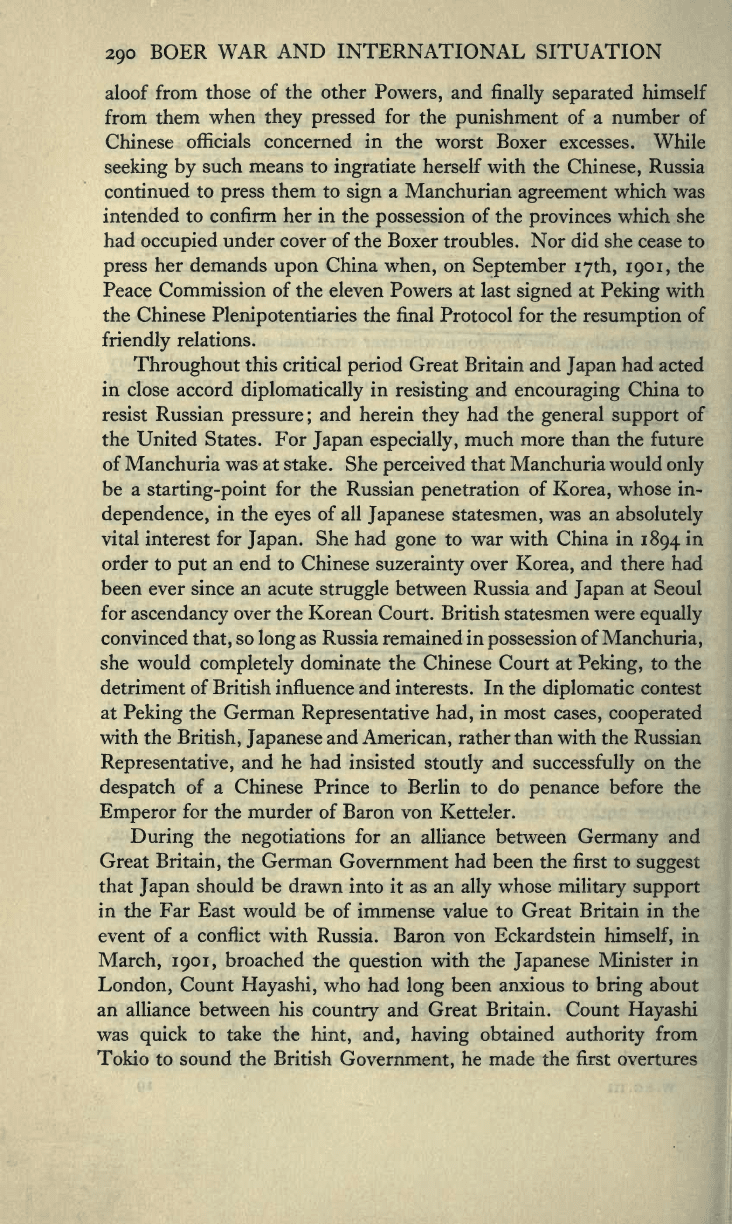
2
9
o
BOER
WAR
AND
INTERNATIONAL
SITUATION
aloof
from
those
of the other
Powers,
and
finally separated
himself
from them
when
they
pressed
for
the
punishment
of
a number of
Chinese
officials concerned
in
the
worst
Boxer
excesses. While
seeking
by
such
means to
ingratiate
herself with the
Chinese,
Russia
continued
to
press
them
to
sign
a
Manchurian
agreement
which was
intended
to confirm her in
the
possession
of
the
provinces
which she
had
occupied
under cover of
the Boxer
troubles.
Nor did she
cease to
press
her demands
upon
China
when,
on
September 17th,
1901,
the
Peace
Commission of
the eleven
Powers
at
last
signed
at
Peking
with
the Chinese
Plenipotentiaries
the
final
Protocol for the
resumption
of
friendly
relations.
Throughout
this critical
period
Great
Britain
and
Japan
had
acted
in
close accord
diplomatically
in
resisting
and
encouraging
China
to
resist
Russian
pressure
;
and
herein
they
had
the
general
support
of
the United States.
For
Japan
especially,
much more than the future
of
Manchuria was
at
stake. She
perceived
that Manchuria would
only
be a
starting-point
for
the
Russian
penetration
of
Korea,
whose in-
dependence,
in
the
eyes
of
all
Japanese
statesmen,
was an
absolutely
vital
interest
for
Japan.
She had
gone
to
war
with China
in
1894
in
order
to
put
an end
to
Chinese
suzerainty
over
Korea,
and
there had
been
ever
since an
acute
struggle
between
Russia
and
Japan
at Seoul
for
ascendancy
over
the
Korean
Court. British
statesmen
were
equally
convinced
that,
so
long
as Russia
remained
in
possession
of
Manchuria,
she
would
completely
dominate
the Chinese
Court at
Peking,
to the
detriment
of
British
influence and
interests.
In
the
diplomatic
contest
at
Peking
the
German
Representative
had,
in
most
cases,
cooperated
with
the
British,
Japanese
and
American,
rather
than with the Russian
Representative,
and
he
had
insisted
stoutly
and
successfully
on
the
despatch
of a
Chinese Prince
to Berlin to
do
penance
before
the
Emperor
for
the murder of Baron von
Ketteler.
During
the
negotiations
for an
alliance between
Germany
and
Great
Britain,
the German
Government
had been
the first to
suggest
that
Japan
should
be drawn
into
it
as an
ally
whose
military support
in
the
Far East would
be of
immense
value to Great
Britain
in
the
event
of
a
conflict with
Russia. Baron
von Eckardstein
himself,
in
March,
1901,
broached
the
question
with the
Japanese
Minister
in
London,
Count
Hayashi,
who had
long
been
anxious to
bring
about
an alliance between his
country
and
Great Britain. Count
Hayashi
was
quick
to
take the
hint, and,
having
obtained
authority
from
Tokio
to
sound
the
British
Government,
he made the
first
overtures
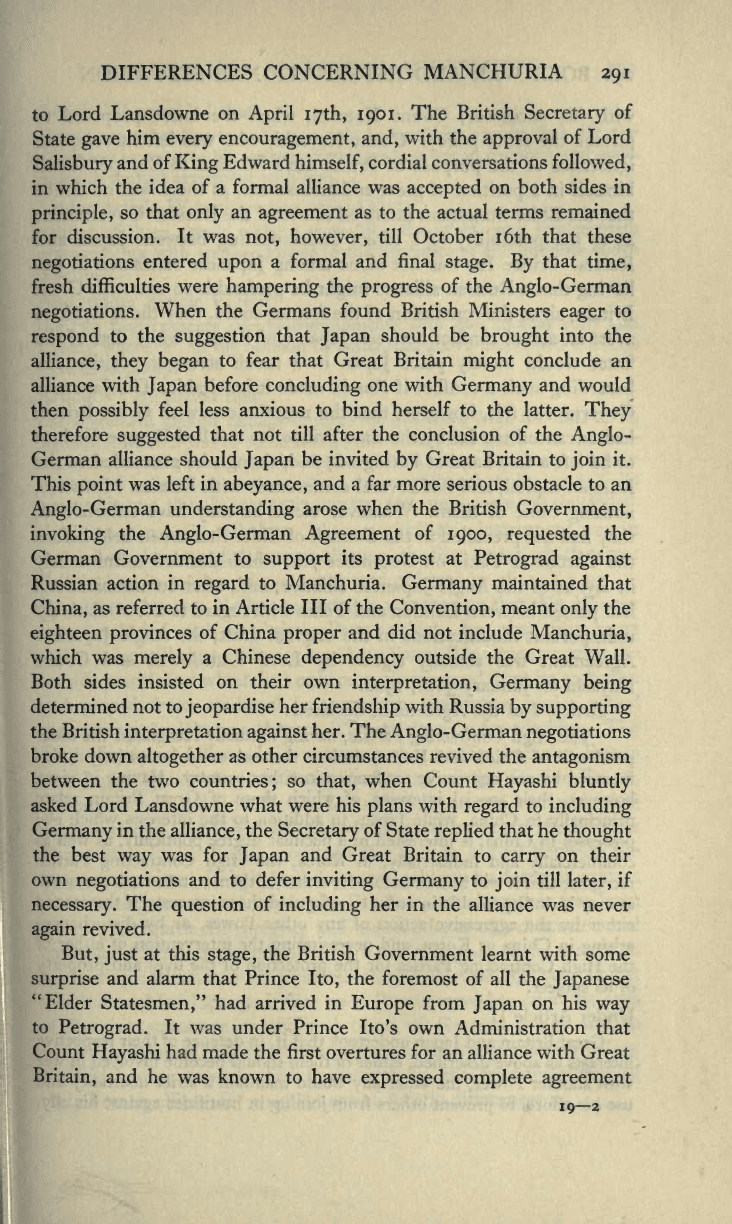
DIFFERENCES
CONCERNING
MANCHURIA
291
to
Lord
Lansdowne
on
April 17th,
1901.
The British
Secretary
of
State
gave
him
every
encouragement,
and,
with the
approval
of
Lord
Salisbury
and
of
King
Edward
himself,
cordial conversations
followed,
in which
the
idea of a formal alliance
was
accepted
on both
sides
in
principle,
so that
only
an
agreement
as
to the actual terms
remained
for
discussion. It
was
not,
however,
till
October 16th that these
negotiations
entered
upon
a formal
and final
stage. By
that
time,
fresh
difficulties
were
hampering
the
progress
of
the
Anglo-
German
negotiations.
When
the Germans
found British
Ministers
eager
to
respond
to the
suggestion
that
Japan
should be
brought
into
the
alliance,
they
began
to fear that Great Britain
might
conclude an
alliance with
Japan
before
concluding
one
with
Germany
and would
then
possibly
feel less anxious to
bind herself to
the latter.
They
therefore
suggested
that not till after the
conclusion
of
the
Anglo-
German
alliance should
Japan
be invited
by
Great Britain
to
join
it.
This
point
was left
in
abeyance,
and a
far more serious
obstacle to an
Anglo-
German
understanding
arose
when
the British
Government,
invoking
the
Anglo-German
Agreement
of
1900,
requested
the
German
Government to
support
its
protest
at
Petrograd
against
Russian action
in
regard
to
Manchuria.
Germany
maintained
that
China,
as referred to
in
Article
III
of the
Convention,
meant
only
the
eighteen
provinces
of China
proper
and
did
not
include
Manchuria,
which was
merely
a Chinese
dependency
outside the
Great
Wall.
Both
sides insisted
on
their
own
interpretation,
Germany
being
determined not
to
jeopardise
her
friendship
with Russia
by
supporting
the British
interpretation against
her. The
Anglo-German
negotiations
broke down
altogether
as other
circumstances revived the
antagonism
between the
two
countries;
so
that,
when
Count
Hayashi bluntly
asked Lord
Lansdowne what were
his
plans
with
regard
to
including
Germany
in
the
alliance,
the
Secretary
of
State
replied
that
he
thought
the
best
way
was for
Japan
and
Great
Britain
to
carry
on
their
own
negotiations
and
to
defer
inviting Germany
to
join
till
later,
if
lecessary.
The
question
of
including
her
in
the alliance was never
in
revived.
But,
just
at this
stage,
the
British
Government learnt
with some
irprise
and
alarm
that
Prince
Ito,
the
foremost
of all
the
Japanese
Elder
Statesmen,"
had
arrived
in
Europe
from
Japan
on his
way
Petrograd.
It was under
Prince
Ito's own
Administration that
!ount
Hayashi
had
made the
first
overtures for
an alliance with Great
Britain,
and
he was known
to have
expressed
complete agreement
19
—
2
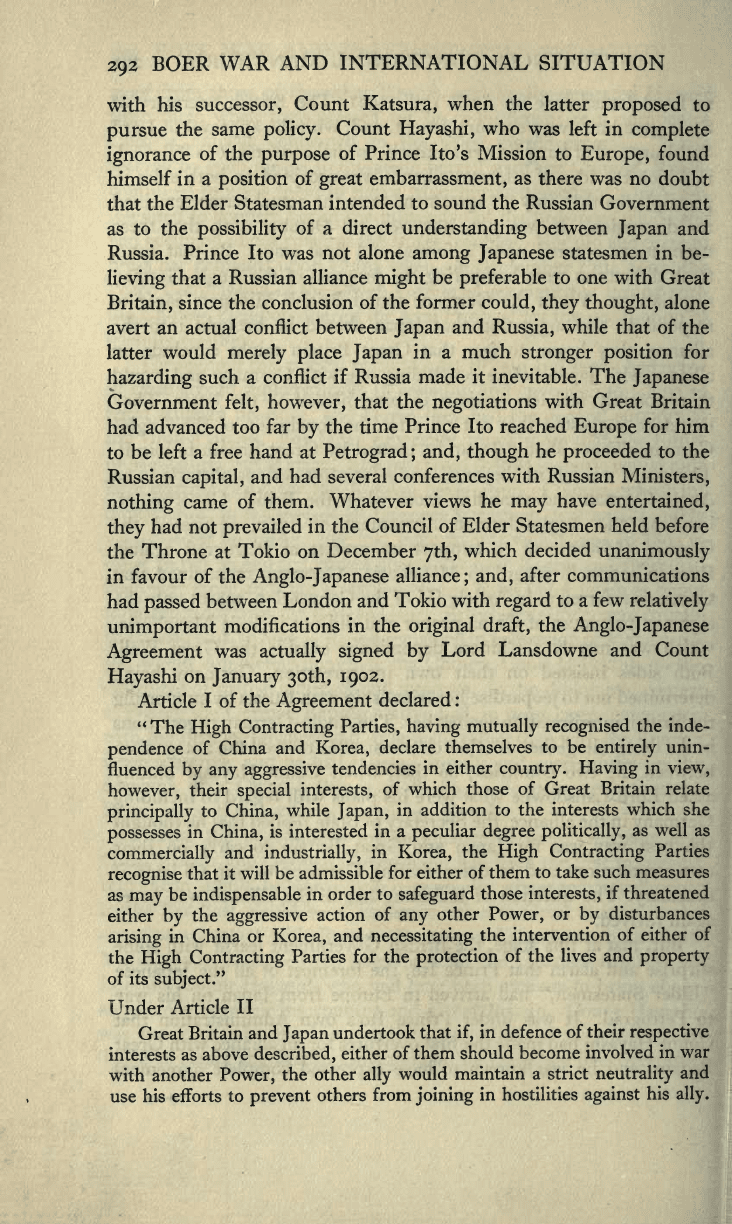
292
BOER
WAR
AND
INTERNATIONAL
SITUATION
with
his
successor,
Count
Katsura,
when the
latter
proposed
to
pursue
the
same
policy.
Count
Hayashi,
who
was
left
in
complete
ignorance
of
the
purpose
of Prince Ito's
Mission
to
Europe,
found
himself
in
a
position
of
great
embarrassment,
as
there
was
no
doubt
that
the
Elder Statesman
intended to
sound the
Russian
Government
as to
the
possibility
of a direct
understanding
between
Japan
and
Russia.
Prince
Ito
was
not
alone
among
Japanese
statesmen in
be-
lieving
that
a
Russian
alliance
might
be
preferable
to one
with
Great
Britain,
since
the
conclusion
of
the
former
could,
they
thought,
alone
avert
an actual conflict
between
Japan
and
Russia,
while
that
of
the
latter
would
merely
place
Japan
in
a much
stronger
position
for
hazarding
such
a conflict
if Russia
made it inevitable. The
Japanese
Government
felt,
however,
that the
negotiations
with Great
Britain
had
advanced too
far
by
the time
Prince Ito reached
Europe
for
him
to
be left
a free
hand
at
Petrograd;
and,
though
he
proceeded
to
the
Russian
capital,
and
had several conferences with
Russian
Ministers,
nothing
came
of
them.
Whatever
views he
may
have
entertained,
they
had
not
prevailed
in the
Council of
Elder Statesmen held before
the
Throne at
Tokio on
December
7th,
which decided
unanimously
in favour
of the
Anglo-Japanese
alliance;
and,
after communications
had
passed
between
London
and
Tokio
with
regard
to
a few
relatively
unimportant
modifications
in the
original
draft,
the
Anglo-Japanese
Agreement
was
actually signed
by
Lord Lansdowne
and
Count
Hayashi
on
January 30th,
1902.
Article
I of the
Agreement
declared
:
"The
High
Contracting
Parties,
having
mutually recognised
the
inde-
pendence
of China
and
Korea,
declare
themselves
to be
entirely
unin-
fluenced
by
any aggressive
tendencies
in
either
country. Having
in
view,
however,
their
special
interests,
of
which those
of
Great
Britain relate
principally
to
China,
while
Japan,
in
addition to the interests
which she
possesses
in
China,
is
interested
in a
peculiar
degree
politically,
as well as
commercially
and
industrially,
in
Korea,
the
High
Contracting
Parties
recognise
that it
will be
admissible
for
either
of them
to take such measures
as
may
be
indispensable
in order
to
safeguard
those
interests,
if threatened
either
by
the
aggressive
action
of
any
other
Power,
or
by
disturbances
arising
in
China
or
Korea,
and
necessitating
the
intervention
of either
of
the
High
Contracting
Parties
for
the
protection
of
the lives
and
property
of its
subject."
Under
Article
II
Great
Britain
and
Japan
undertook
that
if,
in
defence
of their
respective
interests
as above
described,
either
of them
should
become
involved
in
war
with
another
Power,
the other
ally
would
maintain
a
strict
neutrality
and
use his
efforts
to
prevent
others
from
joining
in hostilities
against
his
ally.
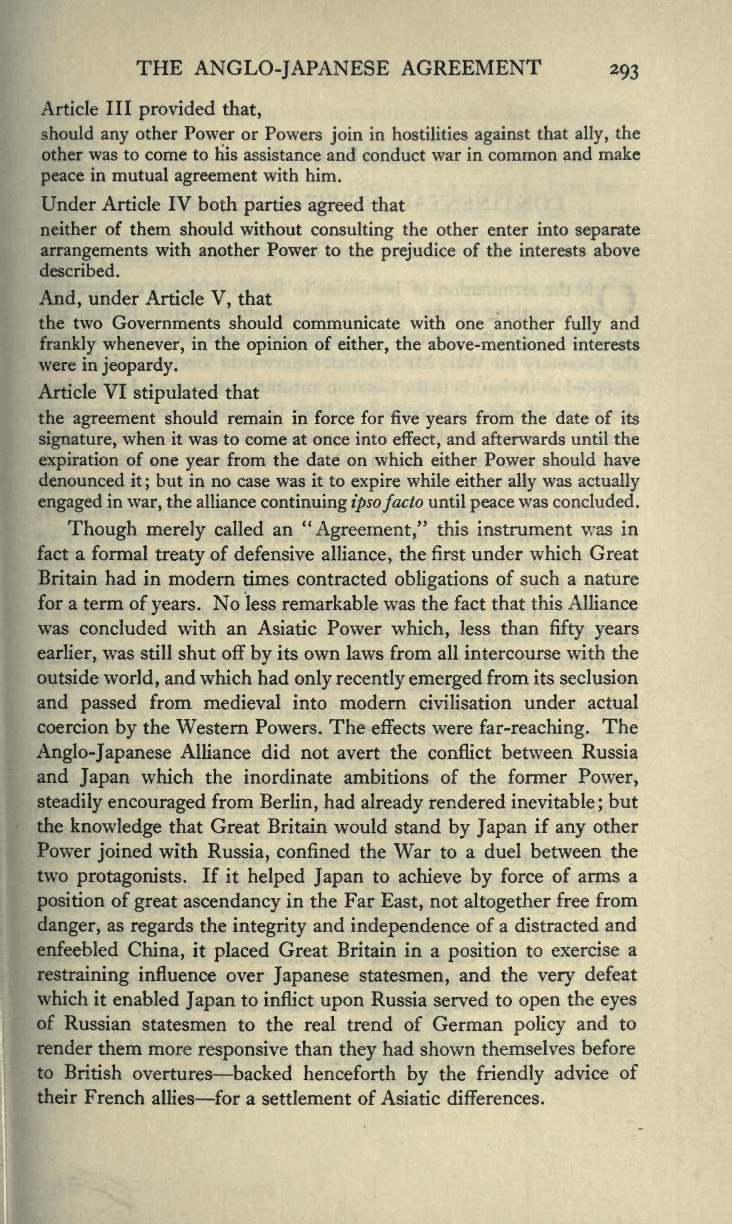
THE
ANGLO-JAPANESE
AGREEMENT
293
Article
III
provided
that,
should
any
other
Power or
Powers
join
in hostilities
against
that
ally,
the
other was
to
come
to
His
assistance
and
conduct
war in common
and
make
peace
in
mutual
agreement
with
him.
Under Article
IV
both
parties
agreed
that
neither
of
them should without
consulting
the other enter into
separate
arrangements
with
another Power
to
the
prejudice
of
the interests
above
described.
And,
under
Article
V,
that
the
two
Governments should communicate with
one another
fully
and
frankly
whenever,
in
the
opinion
of
either,
the
above-mentioned interests
were
in
jeopardy.
Article VI
stipulated
that
the
agreement
should remain
in
force
for
five
years
from the date of
its
signature,
when it was to
come
at
once
into
effect,
and
afterwards
until the
expiration
of
one
year
from the date on which either Power should have
denounced it
;
but in no
case was
it to
expire
while either
ally
was
actually
engaged
in
war,
the alliance
continuing ipso
facto
until
peace
was concluded.
Though
merely
called
an
"
Agreement,'
'
this instrument
was
in
fact
a
formal
treaty
of
defensive
alliance,
the
first under
which Great
Britain had in
modern times contracted
obligations
of such a nature
for a
term
of
years.
No
less remarkable
was
the fact
that this Alliance
was
concluded
with an Asiatic Power
which,
less than
fifty years
earlier,
was
still shut off
by
its
own laws
from all
intercourse
with the
outside
world,
and
which had
only
recently emerged
from
its
seclusion
and
passed
from
medieval
into
modern
civilisation
under actual
coercion
by
the
Western
Powers. The
effects were
far-reaching.
The
Anglo-Japanese
Alliance
did not
avert
the conflict
between
Russia
and
Japan
which
the inordinate ambitions
of
the
former
Power,
steadily
encouraged
from
Berlin,
had
already
rendered
inevitable
;
but
the
knowledge
that Great Britain would stand
by Japan
if
any
other
Power
joined
with
Russia,
confined
the War
to
a
duel
between
the
two
protagonists.
If
it
helped Japan
to achieve
by
force of
arms a
position
of
great
ascendancy
in
the
Far
East,
not
altogether
free
from
danger,
as
regards
the
integrity
and
independence
of a distracted
and
enfeebled
China,
it
placed
Great Britain
in a
position
to
exercise
a
restraining
influence over
Japanese
statesmen,
and the
very
defeat
which
it enabled
Japan
to inflict
upon
Russia served to
open
the
eyes
)f
Russian
statesmen
to the
real
trend
of
German
policy
and to
;nder
them
more
responsive
than
they
had shown
themselves
before
to
British
overtures
—
backed henceforth
by
the
friendly
advice
of
ieir
French
allies
—
for
a
settlement
of
Asiatic
differences.
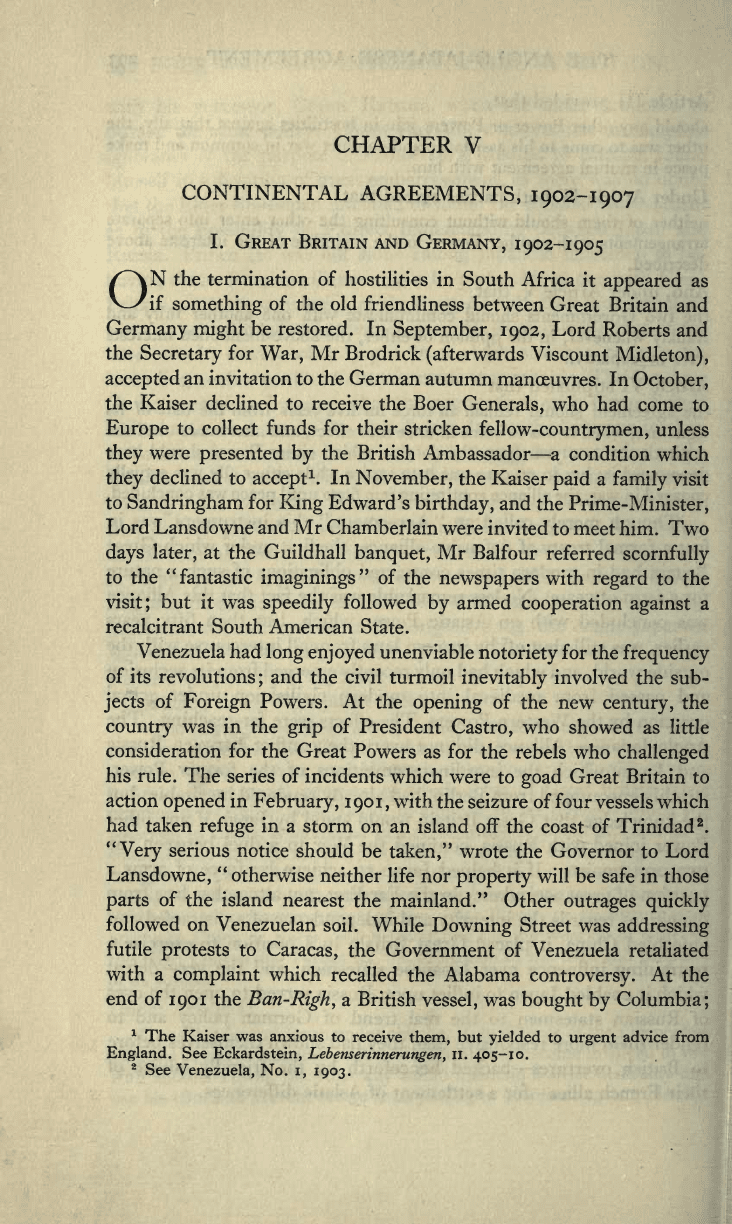
CHAPTER
V
CONTINENTAL
AGREEMENTS,
1902-1907
I. Great
Britain
and
Germany,
1
902-1
905
ON
the
termination
of
hostilities in
South
Africa
it
appeared
as
if
something
of
the
old
friendliness
between
Great Britain and
Germany might
be
restored.
In
September,
1902,
Lord
Roberts and
the
Secretary
for
War,
Mr
Brodrick
(afterwards
Viscount
Midleton),
accepted
an
invitation
to the German
autumn
manoeuvres.
In
October,
the Kaiser
declined to
receive the
Boer
Generals,
who had
come
to
Europe
to
collect
funds for
their
stricken
fellow-countrymen,
unless
they
were
presented
by
the
British Ambassador
—
a
condition which
they
declined
to
accept
1
. In
November,
the
Kaiser
paid
a
family
visit
to
Sandringham
for
King
Edward's
birthday,
and
the
Prime-Minister,
Lord
Lansdowne
and Mr
Chamberlain
were
invited to
meet him. Two
days
later,
at
the
Guildhall
banquet,
Mr
Balfour
referred
scornfully
to the
"fantastic
imaginings
"
of
the
newspapers
with
regard
to the
visit;
but
it
was
speedily
followed
by
armed
cooperation
against
a
recalcitrant
South American
State.
Venezuela had
long
enjoyed
unenviable
notoriety
for
the
frequency
of
its
revolutions
;
and
the civil
turmoil
inevitably
involved the
sub-
jects
of
Foreign
Powers.
At the
opening
of
the new
century,
the
country
was in
the
grip
of
President
Castro,
who
showed as
little
consideration
for
the
Great
Powers as for
the rebels who
challenged
his
rule. The series of
incidents which
were
to
goad
Great Britain to
action
opened
in
February, 1901
,
with
the seizure
of four
vessels which
had
taken
refuge
in
a
storm on
an island off
the
coast
of Trinidad
2
.
"Very
serious
notice should
be
taken,"
wrote the
Governor
to
Lord
Lansdowne,
"
otherwise
neither life
nor
property
will be
safe
in
those
parts
of
the island
nearest the mainland."
Other
outrages
quickly
followed on
Venezuelan
soil. While
Downing
Street
was
addressing
futile
protests
to
Caracas,
the Government
of
Venezuela retaliated
with a
complaint
which
recalled
the Alabama
controversy.
At
the
end of 1
90
1
the
Ban-Righ,
a
British
vessel,
was
bought by
Columbia;
1
The Kaiser was
anxious
to
receive
them,
but
yielded
to
urgent
advice from
England.
See
Eckardstein,
Lebefiserinnerungen,
II.
405-10.
2
See
Venezuela,
No.
1,
1903.
